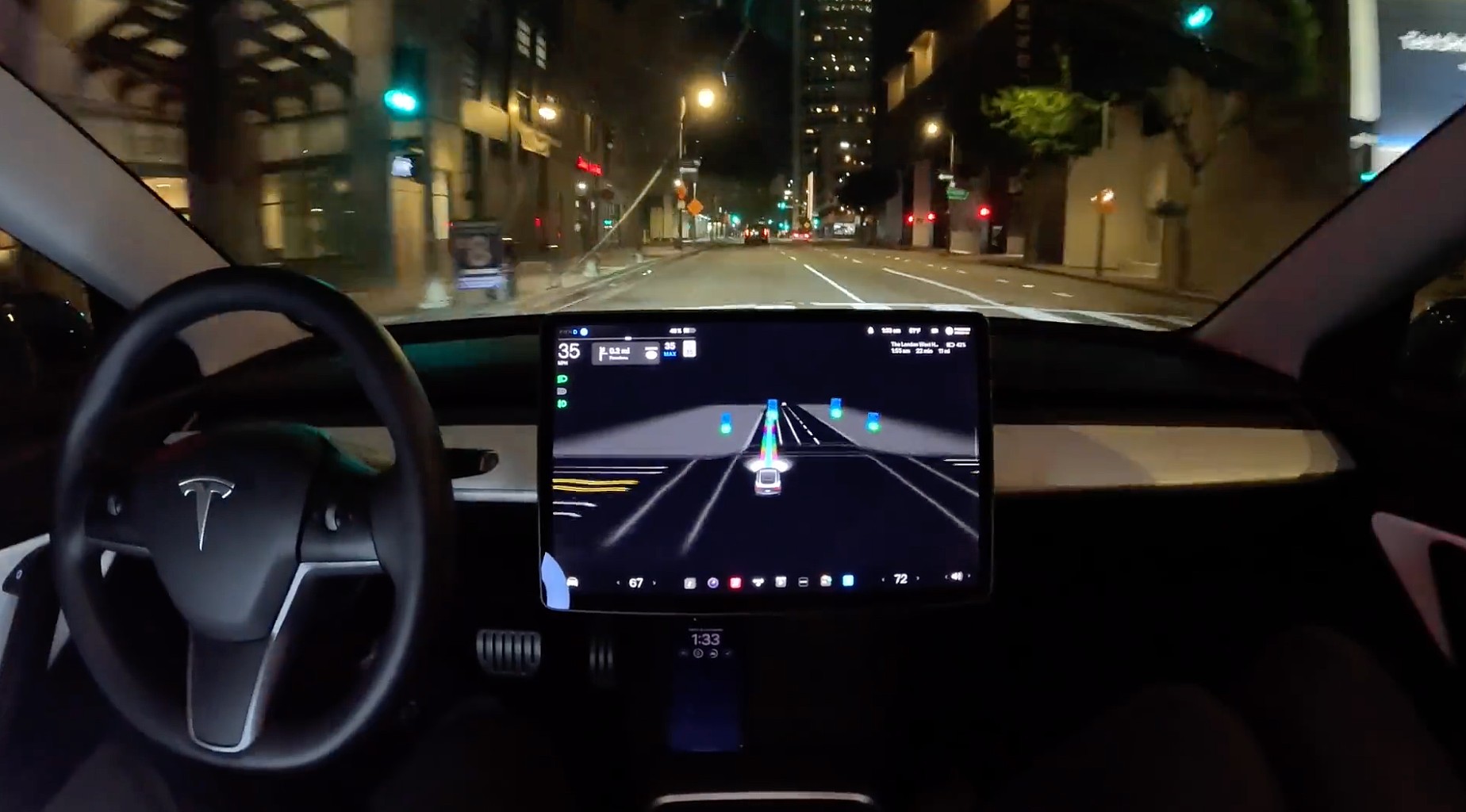
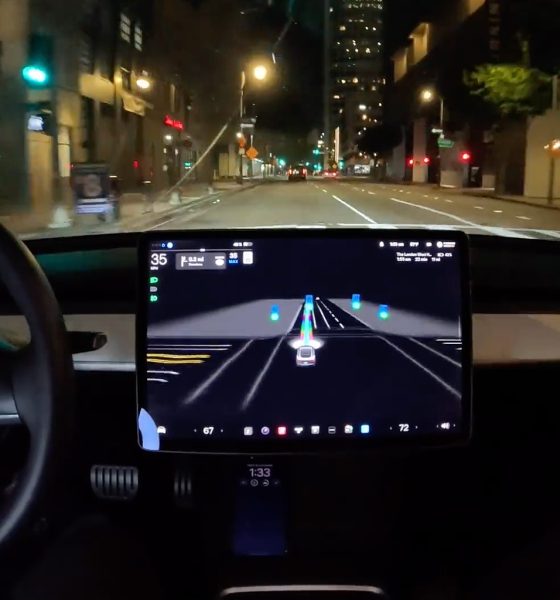
News
Tesla owner’s manuals outside North America hint at FSD beta rollout
Tesla has begun including Full Self-Driving (FSD) beta information in some of its newer owner’s manuals across Europe, China and Australia, further suggesting that the automaker may be inching toward a release of the system beyond North America.
The FSD beta was spotted being tested in Australia and Europe by just a few vehicles earlier this year, and Tesla has been ramping up hiring for the system in China in the past few months. In addition, China debuted a smart expressway for self-driving last month, designed for the use of up to Level 4 driving automation.
On Saturday, Tesla software observer Teslascope pointed out that the automaker has been hinting at the deployment of its FSD beta beyond North America, as details about the software can now be found in newer vehicle manuals from the company in Europe, China, Australia and elsewhere.
Although Tesla has been testing the software outside of North America for years, Teslascope notes that the FSD beta will still require regulatory approval in many countries, even as U.S. officials continue to navigate how to create a regulatory framework around self-driving software.
As a reminder with today’s “hinting” to Full Self-Driving (Beta) outside of North America within Owner’s Manuals, Tesla has been testing their autonomous suite for 2+ years now.
Many countries will require regulator approval, however, we remain confident in expansion soon. https://t.co/tyOkA5jDvN
— Teslascope (@teslascope) November 18, 2023
Credit: Tesla | Model 3 Owner’s Manual in Europe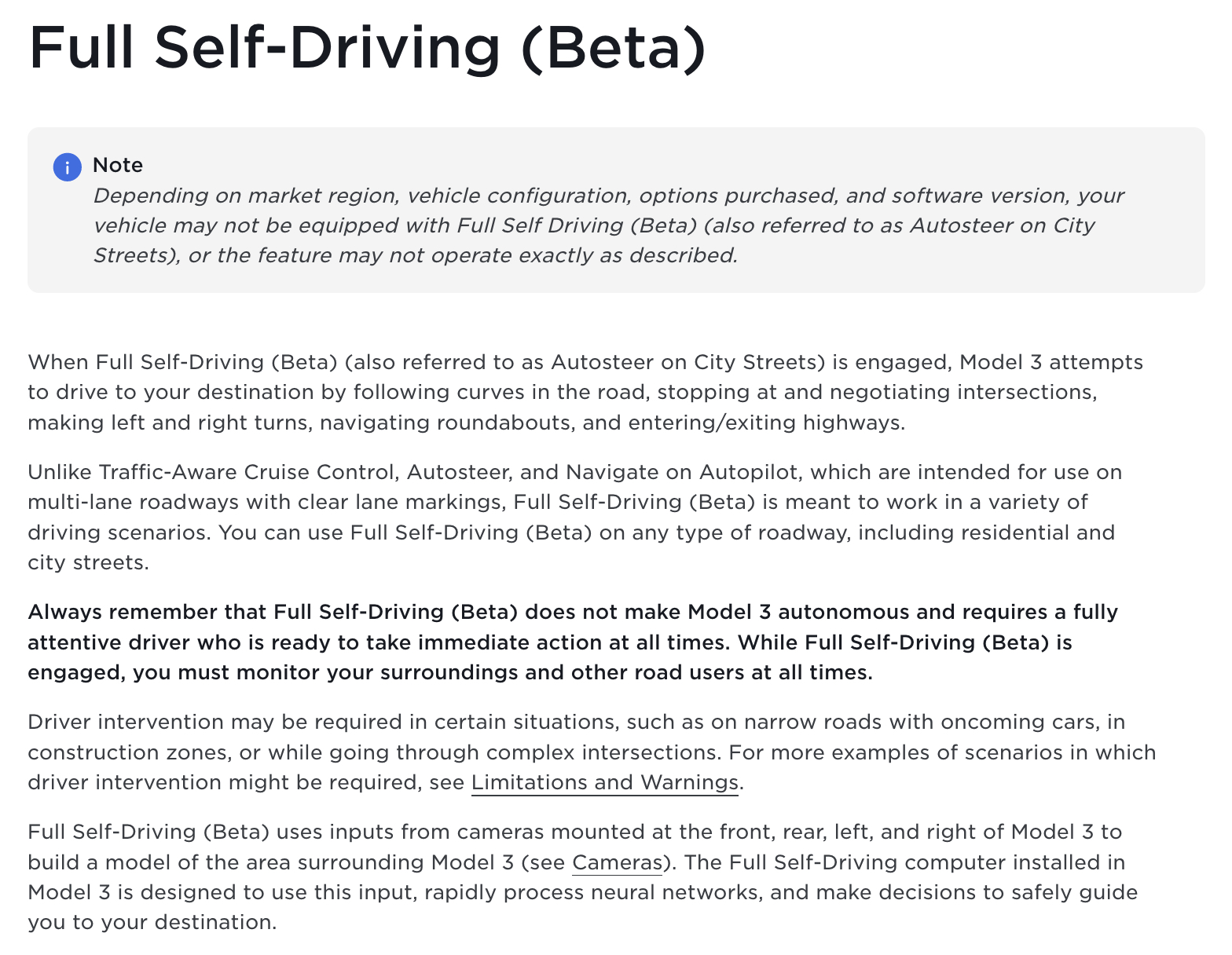
It’s still not clear when Tesla will be rolling the FSD beta out publicly in these regions, though the addition of the system to its owner’s manuals is definitely not a bad thing.
Other sources have also claimed that Tesla’s FSD beta is set to enter the Chinese market, adding that the company is just waiting to announce the news.
https://twitter.com/bentv_sh/status/1725906555361808877
In each of the owner’s manuals, Tesla notes that “Depending on market region, vehicle configuration, options purchased, and software version, your vehicle may not be equipped with Full Self Driving (Beta) (also referred to as Autosteer on City Streets), or the feature may not operate exactly as described.”
The automaker also details plans to roll the feature out to customers beyond North America gradually, as can be seen below from the manuals.
“As Full Self-Driving (Beta) deployment expands, Tesla will gradually make it available to eligible customers in select countries outside of the United States and Canada,” the automaker writes.
“Because every country contains unique infrastructure, driving behaviors, and traffic patterns that Full Self-Driving (Beta) must adapt to over time, it is essential for drivers using Full Self-Driving (Beta) in newly eligible countries to be extra attentive and overly cautious. You must be ready to take over safely at any time.”
The company also notes that its FSD beta is a “hands-on feature that requires you to pay attention to the road at all times,” rather than offering higher levels of automation that would allow the driver to stop monitoring road conditions.
Last month, Tesla’s FSD beta program reached half a billion cumulative miles driven, ahead of the company’s release of the system’s version 12 in North America, which reportedly will no longer be a beta, according to CEO Elon Musk. It’s not clear exactly when the release will take place, though it’s expected to come soon.
In what seemed to be a joke tinged with self-awareness around Tesla’s failure to stick to rollout deadlines and his many prior claims that software would be released in just two weeks, Musk last week said customers might be able to try out FSD version 12 in “about 2 weeks.”
What are your thoughts? Let me know at zach@teslarati.com, find me on X at @zacharyvisconti, or send your tips to us at tips@teslarati.com.

News
Tesla exec pleads for federal framework of autonomy to U.S. Senate Committee

Tesla executive Lars Moravy appeared today in front of the U.S. Senate Commerce Committee to highlight the importance of modernizing autonomy standards by establishing a federal framework that would reward innovation and keep the country on pace with foreign rivals.
Moravy, who is Tesla’s Vice President of Vehicle Engineering, strongly advocated for Congress to enact a national framework for autonomous vehicle development and deployment, replacing the current patchwork of state-by-state rules.
These rules have slowed progress and kept companies fighting tooth-and-nail with local legislators to operate self-driving projects in controlled areas.
Tesla already has a complete Robotaxi model, and it doesn’t depend on passenger count
Moravy said the new federal framework was essential for the U.S. to “maintain its position in global technological development and grow its advanced manufacturing capabilities.
He also said in a warning to the committee that outdated regulations and approval processes would “inhibit the industry’s ability to innovate,” which could potentially lead to falling behind China.
Being part of the company leading the charge in terms of autonomous vehicle development in the U.S., Moravy highlighted Tesla’s prowess through the development of the Full Self-Driving platform. Tesla vehicles with FSD engaged average 5.1 million miles before a major collision, which outpaces that of the human driver average of roughly 699,000 miles.
Moravy also highlighted the widely cited NHTSA statistic that states that roughly 94 percent of crashes stem from human error, positioning autonomous vehicles as a path to dramatically reduce fatalities and injuries.
🚨 Tesla VP of Vehicle Engineering, Lars Moravy, appeared today before the U.S. Senate Commerce Committee to discuss the importance of outlining an efficient framework for autonomous vehicles:
— TESLARATI (@Teslarati) February 4, 2026
Skeptics sometimes point to cybersecurity concerns within self-driving vehicles, which was something that was highlighted during the Senate Commerce Committee hearing, but Moravy said, “No one has ever been able to take over control of our vehicles.”
This level of security is thanks to a core-embedded central layer, which is inaccessible from external connections. Additionally, Tesla utilizes a dual cryptographic signature from two separate individuals, keeping security high.
Moravy also dove into Tesla’s commitment to inclusive mobility by stating, “We are committed with our future products and Robotaxis to provide accessible transportation to everyone.” This has been a major point of optimism for AVs because it could help the disabled, physically incapable, the elderly, and the blind have consistent transportation.
Overall, Moravy’s testimony blended urgency about geopolitical competition, especially China, with concrete safety statistics and a vision of the advantages autonomy could bring for everyone, not only in the U.S., but around the world, as well.
News
Tesla Model Y lineup expansion signals an uncomfortable reality for consumers
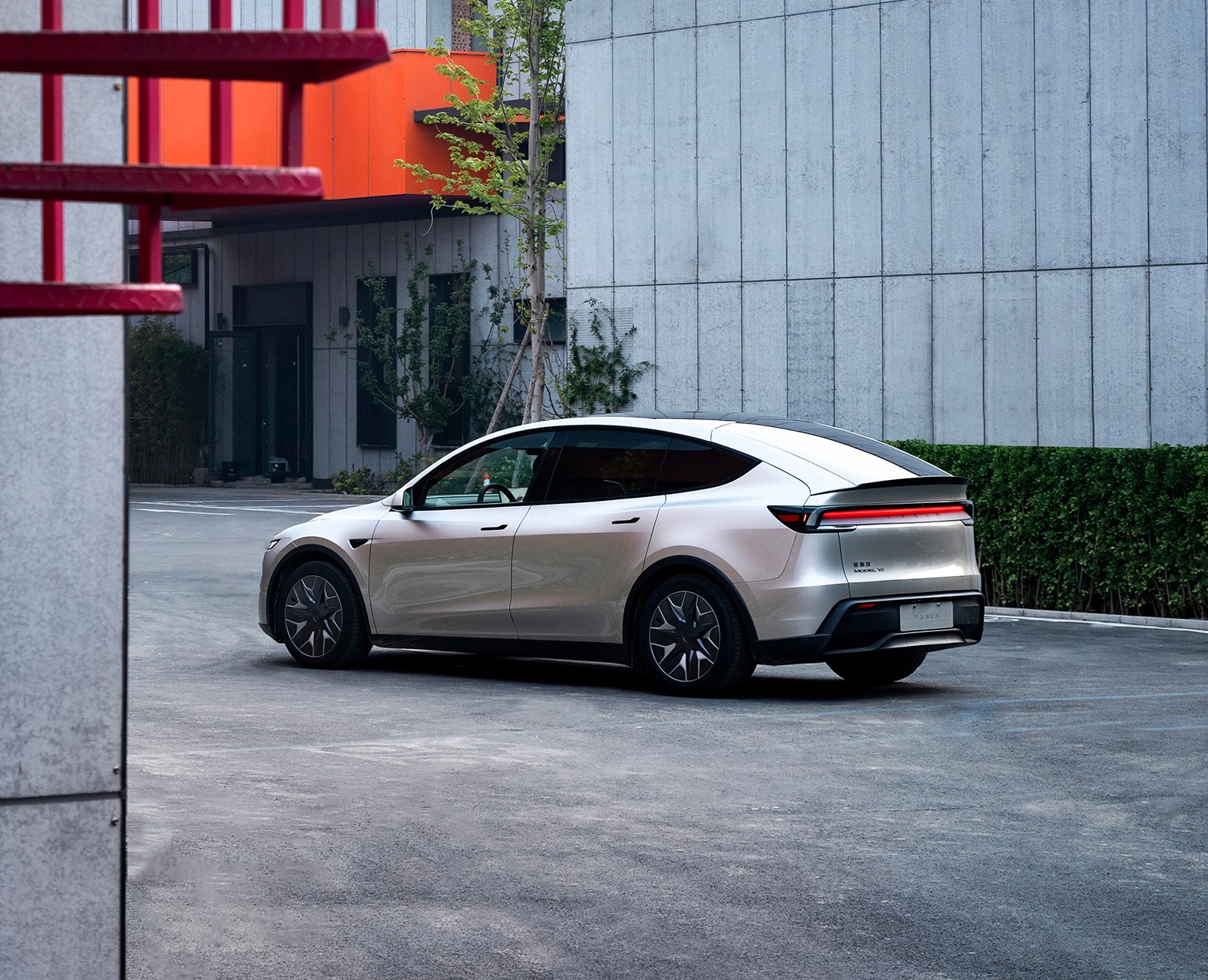
Tesla launched a new configuration of the Model Y this week, bringing more complexity to its lineup of the vehicle and adding a new, lower entry point for those who require an All-Wheel-Drive car.
However, the broadening of the Model Y lineup in the United States could signal a somewhat uncomfortable reality for Tesla fans and car buyers, who have been vocal about their desire for a larger, full-size SUV.
Tesla has essentially moved in the opposite direction through its closure of the Model X and its continuing expansion of a vehicle that fits the bill for many, but not all.
Tesla brings closure to Model Y moniker with launch of new trim level
While CEO Elon Musk has said that there is the potential for the Model Y L, a longer wheelbase configuration of the vehicle, to enter the U.S. market late this year, it is not a guarantee.
Instead, Tesla has prioritized the need to develop vehicles and trim levels that cater to the future rollout of the Robotaxi ride-hailing service and a fully autonomous future.
But the company could be missing out on a massive opportunity, as SUVs are a widely popular body style in the U.S., especially for families, as the tighter confines of compact SUVs do not support the needs of a large family.
Although there are other companies out there that manufacture this body style, many are interested in sticking with Tesla because of the excellent self-driving platform, expansive charging infrastructure, and software performance the vehicles offer.
Additionally, the lack of variety from an aesthetic and feature standpoint has caused a bit of monotony throughout the Model Y lineup. Although Premium options are available, those three configurations only differ in terms of range and performance, at least for the most part, and the differences are not substantial.
Minor Expansions of the Model Y Fail to Address Family Needs for Space
Offering similar trim levels with slight differences to cater to each consumer’s needs is important. However, these vehicles keep a constant: cargo space and seating capacity.
Larger families need something that would compete with vehicles like the Chevrolet Tahoe, Ford Expedition, or Cadillac Escalade, and while the Model X was its largest offering, that is going away.
Tesla could fix this issue partially with the rollout of the Model Y L in the U.S., but only if it plans to continue offering various Model Y vehicles and expanding on its offerings with that car specifically. There have been hints toward a Cyber-inspired SUV in the past, but those hints do not seem to be a drastic focus of the company, given its autonomy mission.
Model Y Expansion Doesn’t Boost Performance, Value, or Space
You can throw all the different badges, powertrains, and range ratings on the same vehicle, it does not mean it’s going to sell better. The Model Y was already the best-selling vehicle in the world on several occasions. Adding more configurations seems to be milking it.
The true need of people, especially now that the Model X is going away, is going to be space. What vehicle fits the bill of a growing family, or one that has already outgrown the Model Y?
Not Expanding the Lineup with a New Vehicle Could Be a Missed Opportunity
The U.S. is the world’s largest market for three-row SUVs, yet Tesla’s focus on tweaking the existing Model Y ignores this. This could potentially result in the Osborne Effect, as sales of current models without capturing new customers who need more seating and versatility.
Expansions of the current Model Y offerings risk adding production complexity without addressing core demands, and given that the Model Y L is already being produced in China, it seems like it would be a reasonable decision to build a similar line in Texas.
Listening to consumers means introducing either the Model Y L here, or bringing a new, modern design to the lineup in the form of a full-size SUV.
Elon Musk
Elon Musk reiterates Tesla Optimus’ most sci-fi potential yet
Musk shared his comments in a series of posts on social media platform X.
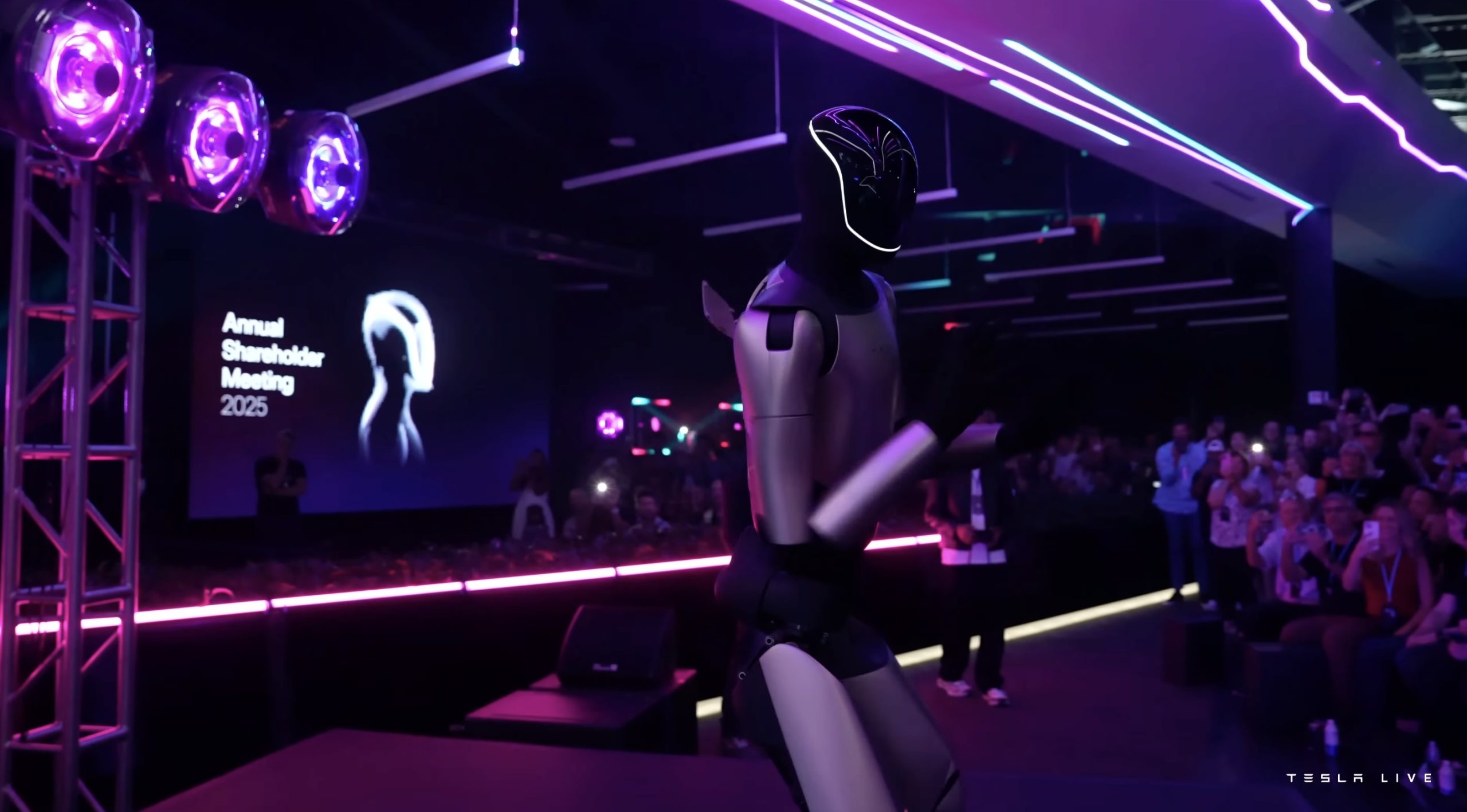
Elon Musk recently reiterated one of the most ambitious forecasts for Tesla’s humanoid robot, Optimus, stating it could become the first real-world example of a Von Neumann machine. He also noted once more that Optimus would be Tesla’s biggest product.
Musk shared his comments in a series of posts on social media platform X.
Optimus as a von Neumann machine
In response to a post on X that pondered on sci-fi timelines becoming real, Musk wrote that “Optimus will be the first Von Neumann machine, capable of building civilization by itself on any viable planet.” In a separate post, Musk wrote that Optimus will be Tesla’s “biggest product ever,” a phrase he has used in the past to describe the humanoid robot’s importance to the electric vehicle maker.
A Von Neumann machine is a class of theoretical self-replicating systems originally proposed in the mid-20th century by the mathematician John von Neumann. In his concept, von Neumann described machines that could travel to other worlds, use local materials to create copies of themselves, and carry out large-scale tasks without outside intervention.
Elon Musk’s broader plans
Considering Musk’s comments, it appears that Optimus would eventually be capable of performing complex work autonomously in environments beyond Earth. If Optimus could achieve such a feat, it could very well unlock humanity’s capability to explore locations beyond Earth. The idea of space exploration becomes more than feasible.
Elon Musk has discussed space-based AI compute, large-scale robotic production, and the role of SpaceX’s Starship in transporting hardware and materials to other planets. While Musk did not detail how Optimus would fit with SpaceX’s exploration activities, his Von Neumann machine comments suggest he is looking at Tesla’s robotics as part of a potential interplanetary ecosystem.








